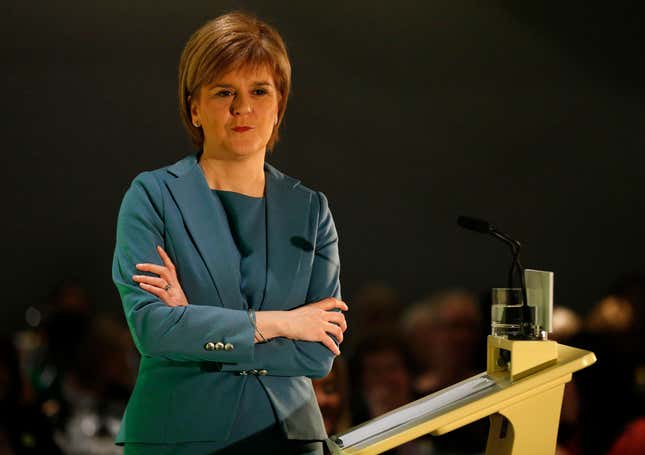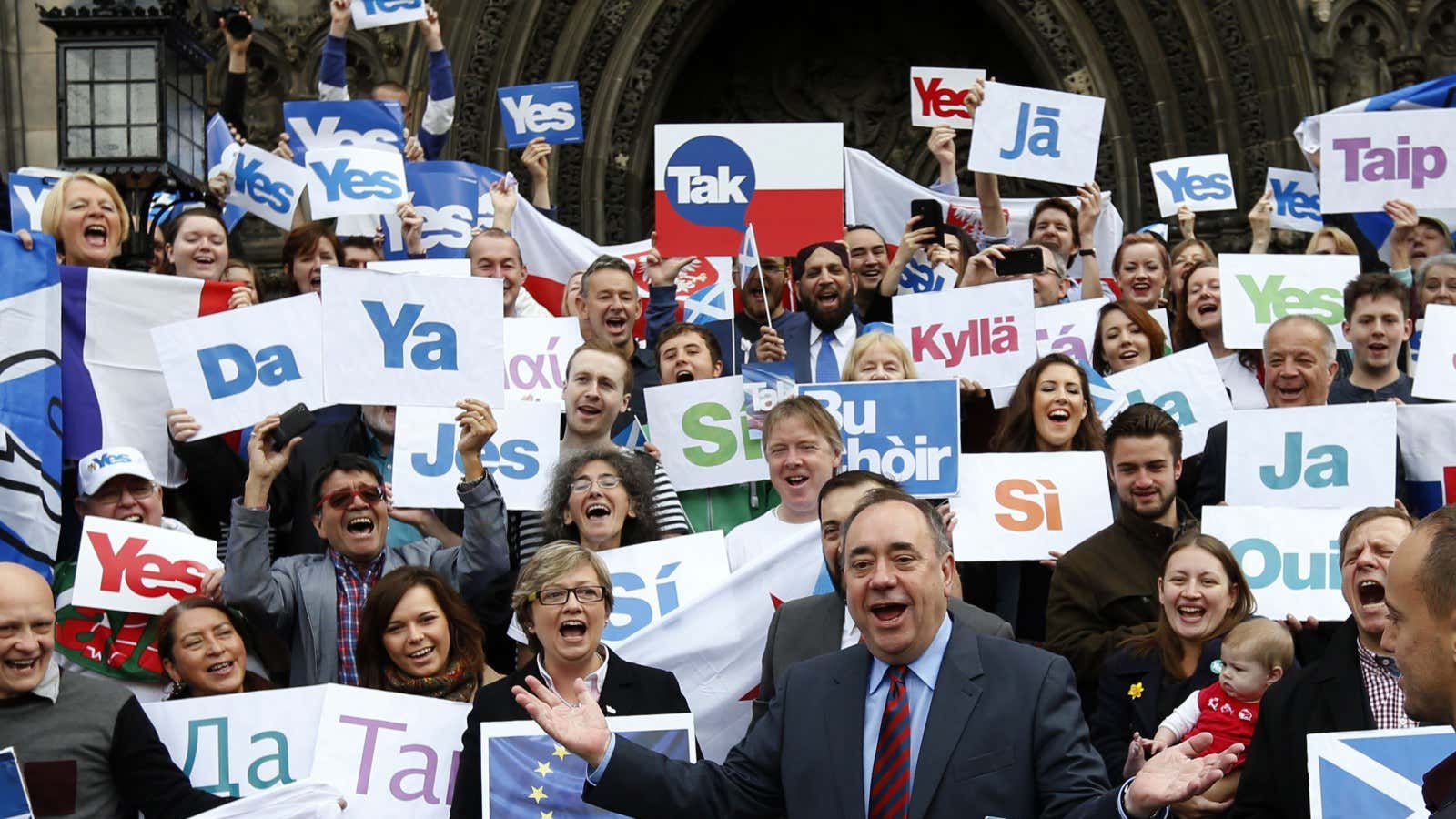Back in September 2014, on the morning after Scotland’s referendum to decide whether or not to break away from the UK, much of Glasgow woke up feeling deflated (paywall). Scotland’s largest city was one of the strongholds of the pro-independence movement, and through the previous evening and night, flag-clad Scots had danced and sung their way around the city’s central square and its pubs in an atmosphere of jubilant expectation. Now, with a vote decisively against the split, it was over.
But seven months on, that morning looks less like an end than the start of something new: a change in Scottish politics that could deliver a historic win for the Scottish National Party in the UK elections next week, and a shift in UK politics that could change the course of its future in Europe.
Since the referendum, the SNP has seen the biggest boost in its history. Its MPs currently hold six seats in the UK’s national parliament, of the 59 Scottish seats available (out of a total of 650 seats). Recent polls suggest the SNP may win as many as 50 of the Scottish seats—or even, one says, all of them—at the May 7 general election.
This huge influx of Scottish MPs, where Labour once held sway, makes the likelihood of a hung parliament—where no party wins decisively—greater. A Labour administration backed up by the SNP is the most likely left-leaning arrangement. The Conservatives could also rule either alone or in coalition; but not with the SNP, which has foresworn any such alliance.
All of this matters for Europe because the UK has been shifting, over the last years, toward a more Eurosceptic stance. The push has come from the far-right UK Independence Party, which focuses almost exclusively on exit from Europe as its main policy plank. UKIP made huge gains in the last months as well, with polls at one point suggesting that they could take 30 seats
Though that now looks less likely, UKIP pressure has pushed Conservative prime minister David Cameron to promise another referendum to the British people, this time on whether to stay in the European Union or to exit.
Of all the potential outcomes of the election—one in which the parties have been criticized for moving towards the center and offering voters few real choices—this could be the most serious for the country’s economy because of the uncertainty it would bring to the markets.
The SNP is profoundly pro-Europe, taking a strong stance in a country whose people favor remaining in the union, but with some reservations. If the SNP holds sway in the next parliament, an exit from Europe is much less likely; if UKIP gains influence, the possibility looms large.
The north road
A year ago, Alex Salmond, then leader of the SNP, was furiously drumming up support for the “Yes” campaign for independence. Scotland has a separate government that already rules on some domestic issues. When Salmond’s party gained its first-ever majority in the Scottish administration in 2011, support for independence was hovering around 30%. It stayed that way for years, until the final few months of the campaign, when it soared so close to the halfway mark that markets began planning for an independent Scotland. The final result was 45% in favor of independence, and 55% against.

With excitement and publicity mounting, the discussion in Europe was about the “domino effect”: other states seeking to become separate from national governments that might gain momentum (paywall) if Scotland seceded. But while separatist movements in Spain and Italy appeared to identify with Scotland’s bid, the SNP rejects the comparison.
“We’re not a separatist movement,” said Alyn Smith, a member of the European Parliament for the SNP for the past ten years. The SNP’s drive for independence is motivated first and foremost by policy, rather than by national identity.
“The only thing we want to be separate from,” he explained, speaking from Strasbourg where the European Parliament is headquartered, “is the Westminster government.”
The SNP opposes a UK referendum on exiting Europe (as does the Labour Party), and if one were forced upon them would insist on a “double majority,” or a separate vote on the issue in Scotland, Smith said.
Rejuvenation
The failure of the independence bid, meanwhile, has done nothing to dampen enthusiasm for active democracy in Scotland. On the contrary, the change it brought about in Scottish politics was “one of the great joys” of the referendum, Smith said, an event that “changed the peoples’ view of Scotland and its position in Europe and in the world.”
It also brought more material changes in policy to the UK as a whole. People aged 16 and 17 could vote in the referendum for the first time, a move which engaged young people in politics as never before. The Labour Party has since promised to lower the voting age in UK elections from 18 to 16 if it is elected in May.

The specter of independence has not disappeared entirely—Conservative insistence on contemplating a “Brexit” from the EU could revive it, SNP leader Nicola Sturgeon told The Economist.
Of course, for a party so keen on European ties, independence presents some dangers. Suggestion flared ahead of September 2014 that Scotland would not automatically remain in the EU, but would have to negotiate its position. That might have included a hasty bid to join the Euro. One line of anti-independence attack came from the Conservative chancellor, George Osborne, who said that Scotland may also have to leave the pound.
In any case, once the dust settled, Scotland was left with the power to make more of its own decisions, concessions the British government promised in its battle against the independence movement. A larger representation in Westminster, meanwhile, could make its voice louder on international issues, as well as domestic policy. (And Sturgeon herself made huge gains in popularity following the televised leaders’ debate last month.) The party’s support of green energy, to take one example, could have more influence at a national level.
And even without a “separatist” agenda, the SNP’s rise could provide a roadmap for splinter groups in other states for how to get what they want without full independence—which anyhow comes with its own set of problems. The fall in oil prices that came soon after Scotland’s “No” vote, for example, would have derailed much of an independent Scotland’s economic planning.
